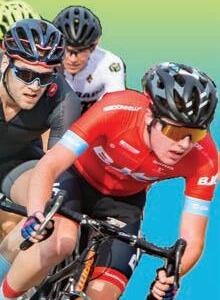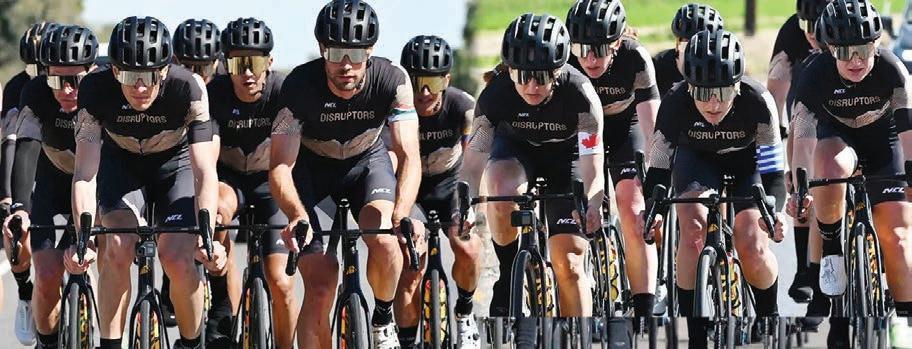
9 minute read
Air regulators o er legal help to neighborhood groups
Free lawyers to represent groups as environmental rulemaking starts
BY MICHAEL BOOTH THE COLORADO SUN
Did you hear the one about the state government o ering the public free lawyers to harass … the state?
It’s no joke. In one of the rst tangible impacts of environmental justice policies and rules that are working their way into multiple battlegrounds overseen by state and federal regulators, Colorado’s public health department now links community groups with pro bono lawyers who can help the groups become o cial “parties” in complex environmental rulemaking, giving them a voice ampli ed by legal muscle.
e rst such e ort will play out later this year as the Air Quality Control Commission writes new rules requiring some of the largest industrial polluters in Colorado to cut their greenhouse gas emissions by set percentages. e community group Climate Equity Community Advisory Council wants to ensure the state requires 18 targeted industrial polluters to make real cuts using the best technology, not just the cheapest. And they want an accounting of the results down the road.
e air commission and many other state agencies have always taken public comments, said Rachael Lehman, a member of the advisory council, and a Community College of Denver faculty member who volunteers to work on environmental issues.
But too often, Lehman said, “the result is ‘We got your comments, now shut up.’ I’ve seen it in multiple situations, where they say, ‘Yes, we had so many community meetings.’ OK. But did they actually listen and incorporate what the community said?”
Regulators from the Colorado Department of Public Health and Environment put the community council in touch with volunteer Wyatt Sassman of the University of Denver Sturm College of Law’s Environmental Law Clinic. ey are now a party to the industrial pollution rulemaking, sitting shoulder to shoulder with the likes of Anheuser-Busch, Cargill, Molson Coors and environmental giants like the Sierra Club.
“It’s important for us to just have that ability to be able to keep an eye on things, and make sure that the rule is being written in a way that is understandable,” Lehman said. She worries that the big companies targeted by the industrial rules “have the big, big pockets, and you can sort of buy your way out of this.” Sassman, she said, is helping the community group understand the rule drafts word by word, and “what’s even in the realm of possibility.”
State o cials said they have worked hard to create meaningful community engagement.
A series of state and federal policies made into law in recent years require agencies to consider how past pollution has disproportionately impacted communities with lower incomes and higher minority populations. By default or conscious zoning, Colorado industries are concentrated in communities like north Denver, Adams and Pueblo counties, and in other locations with measurable impacts on the physical health of lower income residents.
“We just are looking at our process from beginning to end, thinking about how we can interact with all stakeholders and open the door to include voices we aren’t hearing, which was quite a few,” said Lauren McDonell, climate change outreach planner for the Air Pollution Control Division. e division sta s the air quality commission and carries out day-to-day air regulation. e commission’s rulemaking sessions debate how to carry out directives from the legislature. As part of Colorado’s overall e ort to reduce all greenhouse gas emissions by 50% by 2030, the legislature added details in 2021 requiring the largest industrial polluters to cut emissions 20% by that year, from a 2015 base year. Any industrial company emitting over 25,000 metric tons of greenhouse gases a year would need to start limits in 2024.
After rounds and rounds of lings by the parties, public comments and state responses, the commission will take up the industrial rules, called GEMM Phase 2, in September. e list of 18 Colorado companies ranges from American Gypsum to Molson Coors and Cargill Meat Solutions, to Sterling Ethanol and Suncor Energy’s Commerce City re nery.
Public comments are great, McDonell said, but if a community group is granted “party” status, “they’re actually around the table with other entities, who actually can get into the details of the rule language, they can propose di erent language, alternate proposals.” ey don’t require an attorney, but it’s a heck of a lot easier if you have one,” McDonell said. e APCD’s Clay Clarke reached out to the Colorado Bar Association environment committee and wound up with a list of pro bono attorneys willing to dig in on behalf of community groups. e corporations will have their general counsel and expensive private attorneys, and the established environmental nonpro ts have their sta and contract attorneys, Sassman said. Community members who may live right next to the industrial plants, meanwhile, are facing “complex and jargony” issues, in their spare time.
Becoming an o cial “party” has more involvement and in uence, “but it’s also more time, and it comes with deadlines and things that are related to a legal process.

“ at’s where somebody like us could come in and help,” Sassman said.
State o cials say they are prepared to handle the results from their e orts at balance, and know full well they are handing the community a list of lawyers who could make regulators’ lives miserable.
“No one’s ever too happy with us” anyway, McDonell said. “But in all seriousness, I think the priority here is to get the voices to the table to have a normal conversation because historically, again, it’s those wellfunded groups that have been part of the conversation. We don’t have any control or expectation about them being supportive of us or the proposal. We know they’re going to challenge us and we want that, we welcome that.”
Lehman and the advisory council already have some buzzwords in the rule drafts for which they are seeking more legal explanations.
Carbon capture, for example, bothers Lehman to no end. She fears state regulators may allow the industrial polluters to keep spewing damaging air into neighborhoods but then o set it through buying carbon credits or stu ng the carbon underground in long-term storage, an ethically controversial tradeo .
SEE LAWYERS, P25
Denver Disruptors bicycle racers coming to Dick’s stadium
BY JOHN RENFROW JRENFROW@COLORADOCOMMUNITYMEDIA.COM
Can’t get enough professional sports teams in Colorado? Good. e National Cycling League has you covered. It’s bringing an exciting, free professional bicycle race to the Front Range.

e NCL Cup, a series, is in its rst year, and composed of 10 cycling teams composed of men and women — including the league-leading Denver Disruptors. ey compete in three races across the country for one NCL Cup champion to be crowned this fall. e rst event in Miami in April rallied nearly 20,000 spectators. e league is hopeful for similar numbers as cyclists race a course around the Colorado Rapids’ soccer stadium at Dick’s Sporting Goods Park in Commerce City on Aug 13.
“It’s the world’s rst majorityminority and female-owned sports league,” said Reed McCalvin, the vice president of teams and operations for the NCL. “ e four founders, and then myself, a founder with a very little ‘f,’ basically wanted to help change the face of sports and
Call equality in sports.” e founders include successful executives, tech company veterans, NFL agents, lawyers, and more, with high-pro le investors in professional sports, such as the NBA’s Bradley Beal and the NFL’s Jalen Ramsey and Derwin James. ey all have the same goal: to bring cycling to the next level on a new, even playing eld. e races are not multi-day, grueling races with mountain passes somewhere along the way like the Tour de France and ones closer to home from years past, including the Colorado Classic and USA Pro Challenge. e NCL is criterium-style racing, meaning they’re fast-paced as cyclists ride on a set race course, doing laps to gain points along the way. e women and men compete in di erent competition groups for the same team, so each side brings equal weight to the scoreboard.
A new, even playing field
And, the NCL is set up in a way that allows men and women on the teams chances to contribute to the score. Some teams, such as the Denver Disruptors, have a full team of both men and women. Other teams that do not have both women’s and men’s divisions may merge with another women’s/men’s team for the purposes of competing in the NCL Cup Series.
For example, the Goldman Sachs ETFS Racing women’s team and Texas Roadhouse Cycling Team men’s team combined, and they’re currently sitting in third place.
ing teams, and several of the riders are former Olympic and worldrenowned athletes.
Why Denver?
After a year of diligent research, which included meeting advisors from a plethora of other professional sports leagues and studying cycling in America, Denver emerged as a prime candidate for an NCL hub not only to host a local team but to hold events in the future.
“Colorado is just a cycling state,” McCalvin said. “Denver makes it consistently in the top 10 cities. We had a 49-row wide Excel spreadsheet of di erent reasons, including socioeconomics, number of people that bike, what the city spends on infrastructure around bikes, all that stu . Denver was in the top 10 in nearly every category.”
Noah Granigan is one of the Denver Disruptors, as has been a part of the Colorado cycling community since he attended CU Boulder in 2014, where he was a member of the college’s cycling team.
As a fourth-generation international-level cyclist, Granigan has cycling in his blood. He now lives in Superior and said Colorado is the perfect place for cyclists.
“Colorado is such a great place to be a cyclist in terms of training roads, weather, and the massive cycling community so I ended up just staying in the area after I graduated,” Granigan said. “Colorado has become my new home so it’s pretty cool to now be on a Denver-based team.
“Denver is such a strong cycling community because it’s simply a great place to be a cyclist,” Granigan added. “ at’s why there are so many professional cyclists that come from or move to Colorado. e road cycling is world-class, and then you have such incredible mountain biking, gravel, bike parks, and bike friendly cities like Denver on top of that.”
The ‘Ford vs. Ferrari’ model
Call by August 31st to learn about our move-in specials! More choice. More comfort. More you
720•912•5845 of renovating our interior spaces where residents can come together to experience all our community has to offer and to celebrate life. We have a variety of living options, from one to two-bedroom independent living apartments, to assisted living, and memory care. Our goal is to provide an easy living environment that respects and dignifies our residents.
Call by August 31st to learn about our move-in specials! More choice. More comfort. More you
Star Residences of Dayton Place, our focus is on people and compassion. in the process of renovating our interior spaces where residents can come together to experience all our community has to o er and to celebrate life. We a variety of living options, from one to two-bedroom independent living apartments, to assisted living, and memory care. Our goal is to provide an easy living environment that respects and dignifies our residents.
Contact us to schedule a visit Star Residences of Dayton Place South Dayton Street Denver, Co 80247
Contact us to schedule a visit
Five Star Residences of Dayton Place 1950 South Dayton Street Denver, Co 80247
“ e National Cycling League is setting a new standard for inclusivity in professional sports by championing diversity. I was drawn to the opportunity to impact and transform communities through our mission,” said CEO Andrea Pagnanelli. “With more than 50 million cyclists in the U.S., we have an opportunity to grow the passion and excitement for the sport of cycling among the next generation of fans.”
But perhaps the experience and cohesion of the Disrupters is what has them so ahead of the pack. Currently the team is in rst place with a score of 139. e Miami Nights are in second sitting at 95.
“Everybody has a mother, daughter, girlfriend, cousin, niece, what have you, that wants to see them equally represented and paid well. Sport is the great equalizer. One of our underlying taglines is ‘Make bike racing look like America looks,’” McCalvin said.
Just because Denver is a great hub for cycling doesn’t mean the team was guaranteed success. In fact, McCalvin said there was some experimenting in bringing together the NCL, and he followed a popular movie’s method for nding and creating the best teams.
“One of the things I came up with was this ‘Ford vs. Ferrari’ concept,” McCalvin said. “It started with a blank slate. So we have a Miami team that I made more ‘Ferrari’, where it was a bunch of existing criterium racers in America and some track racers. And with Denver, we went with more long endurance road racers and former Tour de France riders and some track racers as well. is was like our beta test for our rst year. We’re just trying to see what works.” www.fivestarseniorliving.com www.fivestarseniorliving.com @2023 Five Star Senior Living



@2023 Five Star Senior Living ere are nearly 30 di erent nations represented in the participat-







